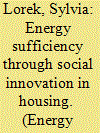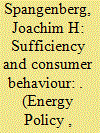| Srl | Item |
| 1 |
ID:
163567


|
|
|
|
|
| Summary/Abstract |
Experience shows that energy savings through energy efficiency measures are partly compensated by income growth, and partly by rebound effects. Therefore to be effective, efficiency measures have to be embedded in a concept of sufficiency which strives for limits and absolute reduction of energy consumption. While the sufficiency concept is not new, it only recently gained attention in the field of housing. This paper provides a basis for broader and more informed debates in policy and research on the potential of sufficiency considerations to contribute to the overall reduction of energy consumption in the residential sector. It recommends shifting the attention from energy consumption of buildings towards a concept of sustainable homes in which e.g. the size of the living area plays a crucial role. A further important aspect is the possibility to fulfil other basic needs like the provision with food, recreation and social contacts in the nearby environment. The paper describes first examples of housing projects guided by sufficiency criteria, depicts the potential roles of different actor groups and points towards some general policy recommendations.
|
|
|
|
|
|
|
|
|
|
|
|
|
|
|
|
| 2 |
ID:
166515


|
|
|
|
|
| Summary/Abstract |
Based on a study of fifty initiatives aimed at reducing energy usage among Swiss households, we uncover what representations of change and forms of engagement are put forward by these initiatives, and the related policy implications. Two ideal-types emerge from our analysis: first, the dominant worldview of change as based on governing behaviour towards ‘better’ individual choices, made possible through rationalising, evaluating, and awareness-raising; second, an ideal-type which involves representations of change based on recognizing the social embeddedness of practices and socio-technical systems. Initiatives that fall into this category seek to transform how everyday life plays out, in relation to energy services and systems of provision, while challenging dominant norms around individuals as central to change. In comparing the Swiss case to over 1,000 initiatives across Europe, we discuss what makes Switzerland a forerunner in relation to this second ideal type. Further, we assess how different forms of engagement are at play, involving the participation of diverse groups of people in initiative design and implementation, while aiming towards more durable, effective and innovative solutions – which we see as a subset of the two ideal types, and one that merits further study.
|
|
|
|
|
|
|
|
|
|
|
|
|
|
|
|
| 3 |
ID:
166578


|
|
|
|
|
| Summary/Abstract |
It is increasingly obvious that for safeguarding environmental sustainability, eco-efficiency measures will need to be complemented by sufficiency, in particular by strong sustainable consumption. The Theory of Planned Behaviour TPB and Social Practice Theory SPT offer different views on consumer behaviour, and on ways to change it. This paper briefly describes the challenges, discusses the applicability of both theories and their meaningfulness for policy recommendations.
|
|
|
|
|
|
|
|
|
|
|
|
|
|
|
|
| 4 |
ID:
089870


|
|
|